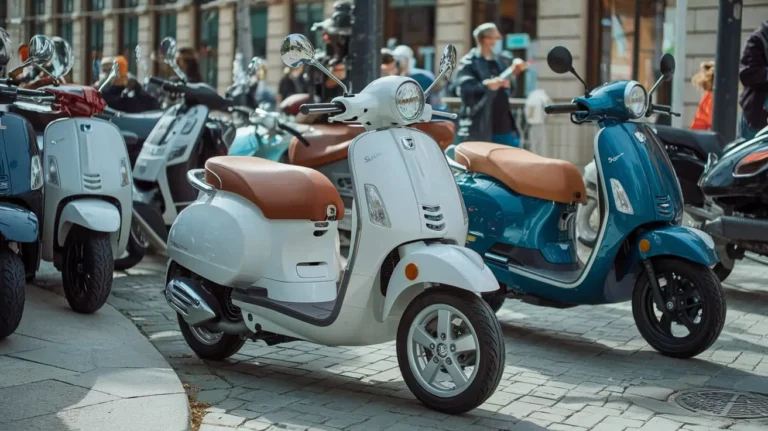Innovation in urban transportation is booming, and three-wheel scooters are leading the path! Imagine an eco-friendly ride that is as smooth as a sports car, as stable as a tricycle, and as environmentally beneficial as embracing a tree.
In addition to being fashionable, these scooters provide a helpful way to combat congested roads and excessive pollution.
There is a 3-wheel scooter for everyone, whether you’re a senior looking for reliable transportation, a commuter trying to avoid traffic, or just someone who enjoys a smooth ride.
If you combine smart technology, zero emissions, and a pinch of fun, you have the city transport of the future.
All set to take the next step?
Let’s examine how three-wheeled scooters are expected to turn the urban jungle into a scooter haven!
1. The Growing Need for Sustainable Urban Mobility
Today, the ever-growing movement of citizens to urban areas has posed immense pressure on common forms of transport. Cities experience traffic jams, poor-quality air, and low efficiency in terms of the time spent commuting.
As climate change becomes more evident, both governments and city planners are looking for environmentally friendly and efficient means of transport.
Thus, 3 wheel scooter has been introduced to address these issues. Compared to the regular 2-wheel scooters, their extra wheel provide stability, allowing them to be used by people with a higher risk of falling, such as the elderly and disabled.
In addition, most of today’s 3-wheel scooters are electrically powered, thus reducing emissions associated with fossil fuel vehicles.
You can Read: Treatments for Flawless Skin
2. Technological Innovations Driving 3-Wheel Scooters
The advancement of technology will have a significant impact on 3-wheel scooters in the future. Some of the technological innovations that are pushing the boundaries of what these vehicles are capable of are listed below.
Battery Efficiency and Range
Lithium-ion batteries are the basis of power in electric vehicles, including 3-wheel scooters. Many automakers are committed to researching ways to improve battery life, time to recharge, and miles per charge. Thus, the range of future 3-wheel scooters can go beyond 100 miles per charge, making transportation suitable for daily commuting.
Smart Features and Connectivity
Manufacturers are starting to produce IoT-enabled 3-wheel scooters that come with GPS navigation and anti-theft features connected to users’ smartphones. In the future, scooters will be equipped with intelligent diagnostics, capable of real-time studying of the traffic environment and improving the choice of the optimal routes, as well as their integration into the shared transport system.
Autonomous Capabilities
Although currently in the testing stage, self-driving technology holds the potential to bring significant changes in 3-wheel scooters’ design. Self-driving scooters may be the subsequent byproduct of rapidly advancing technology, which provides people with the ability to commute without having to hold a steering wheel.
Lightweight Materials
The latest technological improvements, such as more rigid structures using lightweight composites like carbon fiber, have made three-wheel scooters safer while lowering their weight. This leads not only to improved energy indicators but also expanded mobility within high-density urban traffic conditions.
3. Environmental Impact
Significantly, 3-wheel scooters have made a major breakthrough in the reduction of carbon emissions. With the evolution of cities to EV solutions, there is a lot that 3-wheel scooters can contribute to sustainable solutions.
- Reduced Emissions: Unlike cars and motorbikes, electric 3-wheel scooters emit zero tailpipe emissions. As they become utilized in a city, their application has the potential to significantly reduce carbon emissions.
- Energy Efficiency: Despite being smaller and more compact than traditional cars, scooters use far less energy than ordinary transport vehicles.
- Recycling Initiatives: Subsequent versions of scooters will integrate recycled components in addition to decreasing their total ecological footprint in terms of production and disposal.
4. Addressing Urban Challenges with 3-Wheel Scooters
Three-wheel scooters provide a clever and practical way to address some of the most critical mobility issues as cities get more crowded.
Congestion in Traffic
Due to their small size, three-wheel scooters are more effective than vehicles or buses in navigating congested roadways. The demand for parking places in crowded metropolitan settings is also lessened by their capacity to park in compact spaces.
Easily accessible
For riders who might not feel comfortable riding two-wheel scooters, stability is an important consideration. Additionally, these scooters are appropriate for persons of all ages, including older people and those with impairments, because their three wheels offer a more balanced ride.
You can also Read: Hypoallergenic Duvets
5. Regulatory and Infrastructure Considerations
In order for 3-wheel scooters to grow, cities themselves must change and update their demands.
- Dedicated Lanes: Fully dedicated lanes such as bike lanes allow micro-mobility riders to safely commute on the road without having to cross paths with pedestrians or even significant road users.
- Charging Stations: The increase in the number of electric three-wheel scooters will require the development of charging networks to support this mobility product.
- Safety Standards: The authorities will have to set rules regarding the use of helmets, authorized speed, and scooter parking.
- Incentives: Subsidies or tax incentives for electric scooters may help bring them into the market more quickly, as already done by electric cars.
Bottomline
3-wheel scooters have a promising future in urban mobility thanks to changing commuter preferences, environmental requirements, and technological breakthroughs.
Moreover, these vehicles have the potential to transform urban space navigation and make the world cleaner, safer, and more connected by solving existing constraints and encouraging innovation.
The shift is already underway, and 3-wheel scooters have the potential to be a key component of urban transportation networks in the future with the correct investments and legislation.

